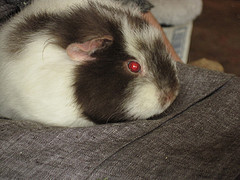|
Guinea Pig Care
Guinea pigs live in groups in the wild and have adapted to become social companion animals who require daily interaction. You may be keep these pets in same-sex pairs if they have been raised together, otherwise, keep adult housed separately. Different types of small animals should not be housed together, this includes rabbits who have been known to attack guinea pigs. The average adult will grow up to 8 to 11 inches in length and can live up to 8 years if cared for correctly Being often described as cute pets because of their many peculiar habits they make excellent family pets, they communicate by making numerous sounds that all have different meanings and often jump in the air, a sign that a guinea pig is happy. Easy to handle pets, who prefer a routine, you will observe that they will prefer a regular time for play, mealtimes and rest periods each day. They are playful inquisitive animals who like to hide in boxes, but will readily appear when anyone approaches their cage, chewing an gnawing are a regular feature of their daily routine, always have Chew Sticks For Small Animals, Feeding & Diet A well balanced diet which should consist of high-quality guinea pig food, 1st Cut Timothy Rabbit and Bunny Hay Keeping Guinea Pigs Indoors Cleaning Cleaning of the cage at least once per week and daily removal of damp spots is recommended. Remove your guinea pig/s and place them in a secure box while you tend to the cleaning of the cage. Remove and dispose of bedding, wash out the base of the cage with a mild soap and water, allow to dry, wipe over the wire and thoroughly scrub the feeding bowls and water bottle, when every thing is completely dry replace the bedding and floor covering and place your pig/s back in their fresh cage. Maintaining a regular cleaning practice will keep your pets healthy and avoid any unwanted odors. Grooming
Good Signs of a Healthy Animal Warning Signs of a Ailing Animal Handling your Guinea pig
Being a nervous creature they need to be handled gently, they are quite fast and the temptation to grab them is a normal reaction, doing this will only make it even more difficult to build up trust. Instead be calm when approaching the animal, place your hand under the pets stomach and scoop him up place your other hand on his back to prevent him from wriggling, hold him close to your body so that he feels secure.
If you have selected a long haired variety then you will need to groom them to avoid their hair becoming clogged, short haired varieties will generally take car of their own grooming. Return from guinea pigs to home page return to small pets
|








